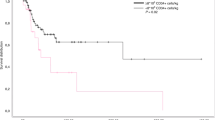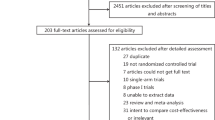Abstract
A phase II trial was performed to evaluate the efficacy and tolerance of vinorelbine (VNB), mitomycin C (MMC), and recombinant human granulocyte colony-stimulating factor (G-CSF) in advanced breast cancer. Between October 1992 and July 1994, 55 patients entered this trial. Nine patients had locally advanced disease and 46 had distant metastases, including 14 who had received previous palliative chemotherapy with (n = 9) or without anthracyclines (n = 5). Therapy consisted of VNB 40-50 mg m(-2) diluted in 250 ml saline infused over 30 min every 3 weeks, and MMC 15 mg m(-2) administered by intravenous bolus injection every 6 weeks. G-CSF was given at 5 microg kg(-1) day(-1) subcutaneously from days 2 to 7 following each cytotoxic drug administration. Treatment was continued in case of response or stable disease for a total of six courses. The overall response rate was 73% for all 55 patients (95% confidence interval, 59-84%), including 12 (22%) complete response (CR) and 28 (51%) partial response (PR); 13 patients (24%) had stable disease (SD), and only two (4%) progressed. All nine patients with locally advanced disease were rated responsive (two pCR, seven PR) and underwent surgery with curative intent. Eight out of nine remain disease free after a median observation period of 18 months (range, 13.5-28 months). Among the 32 previously untreated patients with metastatic disease, nine (28%) achieved CR, 15 PR (47%), seven SD (22%) and one PD (3%). Second-line chemotherapy with this regimen resulted in 7/14 (50%) objective remissions (one CR, six PR), six had SD and one PD. The median time to progression was 12 months (range, 2-24+ months) in previously untreated patients with disseminated disease, and 6.0 months (range, 2-22 months) in those who had failed prior chemotherapy. After a median follow-up time of 20 months, 24 patients with distant metastases are still alive with disease; median survival has not been reached yet. The dose-limiting toxicity was myelosuppression: six (11%) and ten patients (18%) had World Health Organization grade 3, and eight (14%) and nine patients (16%) had grade 4 leucopenia and granulocytopenia respectively. Severe (WHO grade 3) non-haematological toxicities included nausea/vomiting in 7%, constipation in 9%, peripheral neuropathy in 5%, infectious episodes in 7%, phlebitis due to drug extravasation in 5%, alopecia in 9%, and acute reversible pulmonary toxicity in 11%. Our data suggest that vinorelbine, mitomycin C plus G-CSF has an excellent anti-tumour activity in advanced breast cancer, probably superior to most other available combination chemotherapy regimens. This combination does not seem to present significant cross-resistance with previous CMF or anthracycline regimens. Apart from reversible, acute pulmonary toxicity, a rare adverse reaction that had previously been described for VNB, as well as the combination of natural vinca alkaloids with mitomycin C, and few episodes of grade 3 neurotoxicity (all of which occurred at the initial 50 mg m(-2) VNB dose level), the tolerance of this regimen seems acceptable and justifies further evaluation in front-line and salvage therapy of advanced breast cancer.
This is a preview of subscription content, access via your institution
Access options
Subscribe to this journal
Receive 24 print issues and online access
$259.00 per year
only $10.79 per issue
Buy this article
- Purchase on Springer Link
- Instant access to full article PDF
Prices may be subject to local taxes which are calculated during checkout
Similar content being viewed by others
Author information
Authors and Affiliations
Rights and permissions
About this article
Cite this article
Kornek, G., Haider, K., Kwasny, W. et al. Effective treatment of advanced breast cancer with vinorelbine, mitomycin C plus human granulocyte colony-stimulating factor. Br J Cancer 74, 1668–1673 (1996). https://doi.org/10.1038/bjc.1996.607
Issue Date:
DOI: https://doi.org/10.1038/bjc.1996.607



